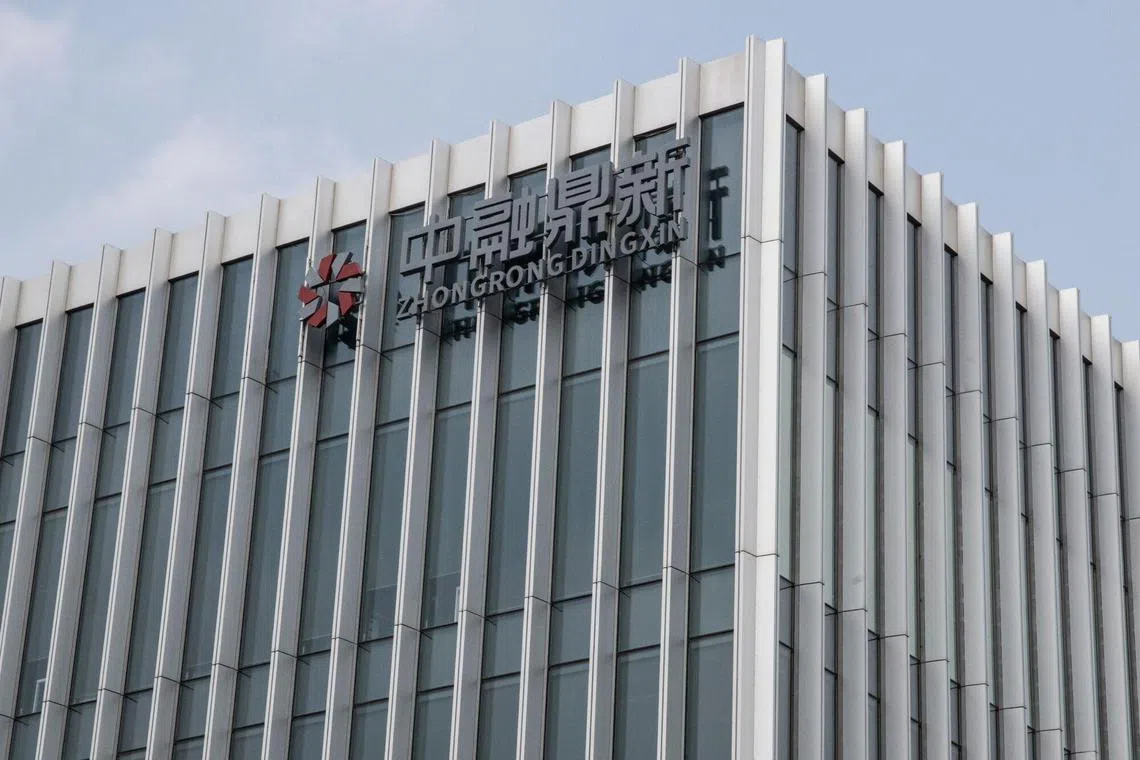China shadow bank crisis sparks protest by angry investors
Sign up now: Get ST's newsletters delivered to your inbox

The Zhongrong International Trust office building in Beijing. The trust has skipped payments on dozens of investment products.
PHOTO: BLOOMBERG
SHANGHAI – Chinese investors have protested outside the Beijing office of one of the country’s biggest shadow banks, in a rare show of public outrage after the firm skipped payments on dozens of investment products.
Videos of the incident appear to show about two dozen protesters at Zhongrong International Trust demanding payment on high-yield products that were pitched as safe investments.
In one of the clips posted on WeChat and seen by Bloomberg News, a woman angrily asks: “Why doesn’t the company pay us back?”
“It has already matured. Your financial statements said there is a profit,” she says.
The protests indicate that troubles at the embattled Chinese shadow bank are deeper than previously known, and underscore how the fallout from the real estate slump is spreading to the financial sector. Many trust products sold by Zhongrong and others are backed by housing projects run by troubled developers such as China Evergrande Group.
Pressure is building across China’s financial markets, given a slew of disappointing economic data, renewed concerns about the property sector and the unfolding crisis in the shadow banking system.
Investors are calling for more aggressive easing by Beijing as the incremental policies have so far failed to revive confidence. A sell-off in Chinese assets deepened on Wednesday, with the MSCI China Index down as much as 1.3 per cent.
Zhongrong is among the biggest companies in the country’s US$2.9 trillion (S$3.9 trillion) trust industry, which pools savings from wealthy households and corporate clients to make loans and invest in real estate, stocks, bonds and commodities. The firm has 270 high-yield products totalling 39.5 billion yuan (S$7 billion) due in 2023, according to data provider Use Trust.
The Chinese authorities have already set up a task force to study any possible contagion from the shadow banking group, which manages about US$138 billion. The firm has said that it has no immediate plans to make clients whole.
Mr Wang Qiang, board secretary of the firm, which is partly owned by financial giant Zhongzhi Enterprise Group, told investors at a meeting earlier this week that it missed payments on a batch of products on Aug 8, adding to delays on at least 10 others since late July, according to people familiar with the matter.
At least 30 products are now overdue and Zhongrong also halted redemptions on some short-term instruments, one of the people said.
Cash crunch
Mr Wang said liquidity at the firm has suddenly dried up. The company is facing a “tsunami” of questions from investors and their own wealth managers, according to people familiar with the situation. Mr Wang asked for patience as the firm seeks to recoup the value of its investments.
Zhongzhi is among the private wealth managers that Beijing has been trying to rein in for years to minimise risks for the hundreds of thousands of retail clients who buy these products, with the assumption that they are safe.
China is already struggling with a weak economy and fallout from a property slump that is threatening to push giants like Country Garden Holdings into default. The central bank on Tuesday cut interest rates by the most in three years in a bid to revive growth.
According to Bloomberg Economics, the trust sector’s exposure to real estate is about 2.2 trillion yuan (S$413.4 billion), or 10 per cent of total assets, as at the end of 2022. Zhongrong is the ninth-biggest trust, with about 600 billion yuan in assets.
“The big danger is that a negative feedback loop kicks in, with property stress causing strains in the financial system, undermining credit expansion and depressing growth, which, in turn, exacerbates the slump in the property sector,” Bloomberg Economics said in a note.
Zhongrong investors are now losing patience. Many bought the products and paid as much as 7 per cent annual interest, betting that these would be a safe bet as Chinese stocks and real estate prices tumble.
The protesters in Beijing were met by about 10 police and security officers, while a company official tried to keep the peace.
One woman was heard shouting: “Give us the money back, or we will die here.”
Another said: “Why you don’t give us a clear explanation?”
A reporter who visited the Zhongrong office on Wednesday afternoon did not see any protesters but there was an unusually heavy police presence around the building. Officers were seen sitting in several police vans and cars parked inside and outside the office compound, and other police vehicles were placed on roads nearby.
Officers were also watching the area from inside one of the several city buses that were parked at the main gate or nearby. Workers were erecting extra fencing around the building.
Police in Beijing did not immediately respond to a request for comment.
Protests over financial disputes are fairly common in China but the authorities are unlikely to tolerate them for long, especially in the capital where authorities prize stability.
Police quickly broke up demonstrations in Beijing and other cities in late-2022 over the government’s harsh zero-Covid rules.
A series of demonstrations also erupted in 2022 in the central province of Henan over a suspected financial scam. Police and protesters clashed as hundreds of people demanded the return of deposits worth up to tens of billions of yuan. BLOOMBERG


